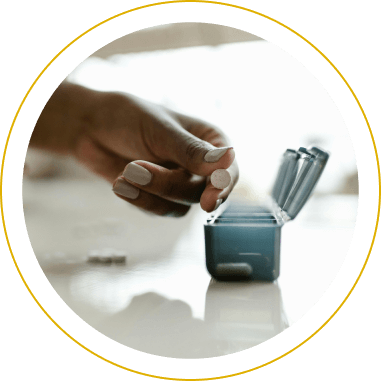Personalized OCD Treatment Online
See a healthcare provider licensed in your state and treat OCD online. Begin with a 30-minute video call for assessment and treatment plan.

Why MEDvidi
-
Experienced medical team
-
Affordability
-
Evidence-based treatments
-
Comprehensive care
-
Patient-centered plans
-
Personalized approach
Online Treatment for Obsessive-compulsive Disorder
Sign up and create an account to book your online appointment in a minute.
Discuss your experiences and concerns in a secure and private environment. A healthcare provider will assess your symptoms and offer suitable treatment strategies.
Regular follow-up sessions can help to track your progress, adjust your treatment plan, and ensure ongoing support.
Manage OCD with the help of compassionate, evidence-based care.
Pricing
- An online 30-minute visit
- Symptoms check
- Identifying treatment goals
- Developing a treatment plan
- Prescribing medications if necessary
- Regular 15-minute visits
- Symptoms monitoring
- Prescription refill
- Treatment adjustments
- Working on behavioral changes
Meet Our Medical Team
Schedule virtual appointments with clinicians experienced in OCD treatment. Obtain a holistic treatment plan designed exclusively for your needs.
All-in-one Personal Portal
- Easy scheduling: Schedule a visit from your couch, any time, no waiting in line!
- Comprehensive visit management: Reschedule your appointment in a few clicks.
- Plan in advance: No forgetting to schedule that follow-up next month!
- Track your prescription online: Check your prescription status anytime and know when the medication is ready to pick up.
- Switch pharmacies: Your chosen pharmacy doesn't have your medication? Select another one in a minute.
- Save personal details: No need to repeatedly fill out personal and medical information. Just choose a date and time to book a visit.

When to Seek Professional Help for OCD
If your symptoms persist, cause significant distress and anxiety, and interfere with your everyday life, relationships, and overall well-being, it’s recommended to seek professional help.
Early intervention can lead to better outcomes. A clinician will perform a thorough assessment, provide a diagnosis, and suggest appropriate treatment options such as therapy, medication, or a combination of both.
What Can Cause OCD?
OCD is believed to be a complex interplay of various factors.
Imbalances in specific neurotransmitters, like serotonin, are believed to contribute to OCD by affecting mood, anxiety, and behavior regulation.
Some people may experience OCD symptoms after stressful life events, trauma, or significant life changes.
Abnormalities in specific brain regions, such as the orbitofrontal cortex and basal ganglia, have been linked to OCD due to their association with decision-making, impulse control, and emotional processing.
In some cases, OCD symptoms may be caused by viral, bacterial, or parasitic infections. In addition, autoimmune disorders are also associated with the development of OCD.
Certain personality traits, such as perfectionism or an excessive sense of responsibility, may contribute to OCD.
Do you want to know if your symptoms indicate OCD and what could cause it?
Consult state-licensed healthcare providers at MEDvidi.
OCD Symptoms
According to the Diagnostic and Statistical Manual of Mental Disorders, common symptoms of OCD include obsessions and compulsions.
- Distressing and intrusive thoughts, urges, or images unrelated to real-life concerns. These thoughts often provoke anxiety or discomfort and can revolve around contamination fears, fears of harm, or a need for perfection.
- Repetitive behaviors or mental acts (checking things several times, counting, or arranging items) that individuals feel compelled to perform as a response to their obsessions. These actions aim to reduce the distress, even though they may only offer temporary relief.
The obsessions and compulsions consume a significant amount of time, usually more than one hour per day. They cause significant distress or interfere with daily functioning, relationships, or other areas of life.
Individuals with OCD often recognize their obsessions and compulsions but struggle to control them.
With professional help, it’s easier to manage the symptoms and lead a more fulfilling life.
How to Treat OCD
Dealing with obsessive-compulsive disorder on your own can be difficult and less effective. At MEDvidi, you can receive the treatment and support you need.
The first step toward recovery is a thorough diagnostic assessment. It forms the foundation of a personalized treatment plan. OCD treatment can include psychotherapy and medication management.
Psychotherapy
Common therapy options for OCD include cognitive-behavioral therapy (CBT) and exposure and response prevention (ERP). During therapy sessions, a practitioner gains insight into your thoughts and behaviors associated with OCD and teaches you practical strategies to manage them.


OCD Medications
Medication management can be a part of treatment for obsessive-compulsive disorder. There are two main types of medicines prescribed in this case:
- Selective serotonin reuptake inhibitors (SSRIs): These antidepressants, such as fluoxetine or sertraline, are usually the first medication choice for OCD treatment. They can increase serotonin levels in the brain and reduce OCD symptoms.
- Serotonin-norepinephrine reuptake Inhibitors (SNRIs): If SSRIs are ineffective, healthcare professionals may consider prescribing SNRIs like venlafaxine.
Your healthcare professional will determine the specific medication and dosage based on your individual needs. Regular monitoring is also necessary to evaluate effectiveness and manage potential side effects.
Frequently Asked Questions
Can I treat OCD myself?
Self-help techniques like mindfulness meditation can help manage mild OCD, but it’s still important to consult a healthcare provider to monitor progress and choose the most effective options. For moderate to severe cases, professional help is crucial.
Can OCD be diagnosed online?
You can obtain a formal OCD diagnosis online from a licensed medical practitioner after a comprehensive examination. While many online tools are available to better understand the possibility of having this condition, they should not be used as a substitute for a professional evaluation.
Can OCD be treated online?
Licensed healthcare providers can diagnose and treat OCD online because they follow the same guidelines as practitioners in walk-in clinics. Both medication management and counseling can be delivered remotely.
Is OCD a coping mechanism for anxiety?
OCD is a separate mental illness marked by intrusive, recurring thoughts (obsessions) and actions performed in an attempt to reduce tension (compulsions). However, anxiety frequently coexists with OCD and can make symptoms worse.
Can you get OCD medicine online?
Practitioners at MEDvidi can prescribe medications for OCD online. However, the decision about the necessity of pharmacological treatment is made by a clinician based on the assessment of your symptoms and other aspects.
Which doctor can treat OCD?
Different healthcare professionals can help treat OCD, such as psychiatrists, psychologists, therapists, and counselors. If needed, a psychiatrist can prescribe medication. Meanwhile, psychologists and therapists can offer cognitive-behavioral therapy (CBT) or exposure and response prevention (ERP) therapy, which have been proven effective for treating OCD.









